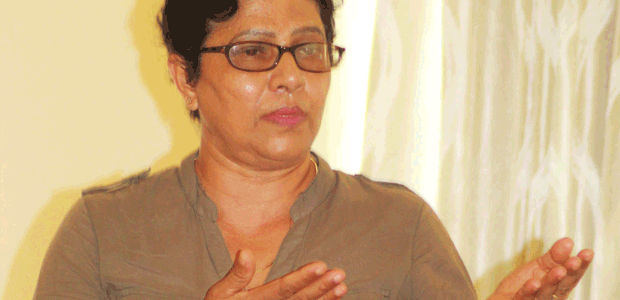
Activism in the School Sector A Sinhalese Fights for the Rights of Muslim Teachers
UPUL THAMMITA
In conversation with the Secretary of Inter-faith Committee of Kandy, Renuka Maliyagoda
Future generations are the lifeline of a nation. Protecting teachers who educate such generations then is our national responsibility. Renuka Maliyagoda is a retired teacher who fights for the rights of such teachers. She is the secretary of the Inter-faith Committee of Kandy. Now she focuses on the rights of Muslim female teachers.
THE CATAMARAN: How do you introduce yourself?
I am a teacher by profession. I retired after 28 years of service. I could have served for another 12 year, but I opted for early retirement to work for civil organizations. I was the former secretary of Kandy district of Ceylon Teachers’ Union. I am still an active member of the union. I retired early to dedicate my life to the rights of the teaching service.
THE CATAMARAN: You are fighting for the cultural rights of Muslim women now. What is the reason for that?
Kandy is a multicultural and multi-religious city. However, the existing ethnic peace among communities here became a little fragile after the April 21st, Easter Sunday attacks. Muslim women suffered a lot in that backdrop and they face a lot of problems due to our patriarchal systems within and outside of their community. They do not want to speak about their problems openly. Muslim women expect a change while protecting their cultural heritage. Unfortunately, they do not get any support from their community or from wider society. There is no discourse on this.
A dialogue opened up after Easter Sunday attacks. Seven Muslim women in a girls’ school in Kandy faced problems due to their cultural practices. The administration of the school violated all the rules and regulations in the process of taking revenge on these seven teachers. I decided to fight for them.
The cause for the controversy was Abaya and Hijab. I had worked in this school since 2005 and the Muslim teachers wore Abaya and Hijab throughout that period. However, they did not wear black clothes. They wore light colours and attended school neatly.
The school administration and a group of parents created a controversy regarding their clothes after the Easter Sunday attacks. Violating the rules, regulations and circulars, they forced the teachers to wear sarees to school. Even under emergency regulations, the government only banned the Burka. These teachers never wore Burka to the school and they felt dejected. They were ultimately banned from attending school. Without their consent, authorities attached them to another school.
THE CATAMARAN: How do you view the duties and responsibilities of the teaching profession in terms of ethnic unity?
School is the most important place to build national unity. Teachers are like prophets to students. In that view, the girls’ school that caused the controversy was a miniature replica of Sri Lanka. The students of belong to all religions and are very friendly with one another. They knew no racism. The environment in a school must be like that. However, unscrupulous elements injected a racist poison in the school. The respect of the teachers declined. This is a highly erroneous example in a place like a school.
THE CATAMARAN: Were you invited by the Muslim community to mediate a solution?
Yes. As an activist of the Ceylon Teachers’ Union, I always focus on the problems of the teachers. The union does not care about race and religion, and appear for the rights of the entire teaching profession. History outlines how Muslim leaders fought for the rights of teachers. However, such leaders are rarely created today. The reason, as I see, is the impact of three decades of war. The struggle of one ethnic community was over-emphasized while the struggles of the other communities were not.
THE CATAMARAN: What is the present situation of the seven female Muslim teachers who were subjected to injustice?
The education administration attached these seven teachers to Muslim schools. We see it as an ethnic-oriented act because they were attached to a mono-ethnic school from a mixed ethnic school.
THE CATAMARAN: What actions were taken by the Inter-faith Committee of Kandy to seek justice for these teachers?
We first made people in education, political and defence authorities aware of the situation. When there was no result, we sought the help of the law itself. We filed a fundamental rights petition in the Supreme Court against the school administration and the Provincial Ministry of Education. We believe that the law will provide us with justice. Now the chiefs of the Provincial Ministry of Education have sent letters to the teachers asking them to report to the duty of their previous schools. But the school administration does not obey the orders of the authorities. Therefore, we will wait until the law is implemented. This is only one incident. We will see more problems of this type on our little island until the majority community understands and feels the minorities. We will always struggle against such narrow views.
This article was originally published on the catamaran.com








